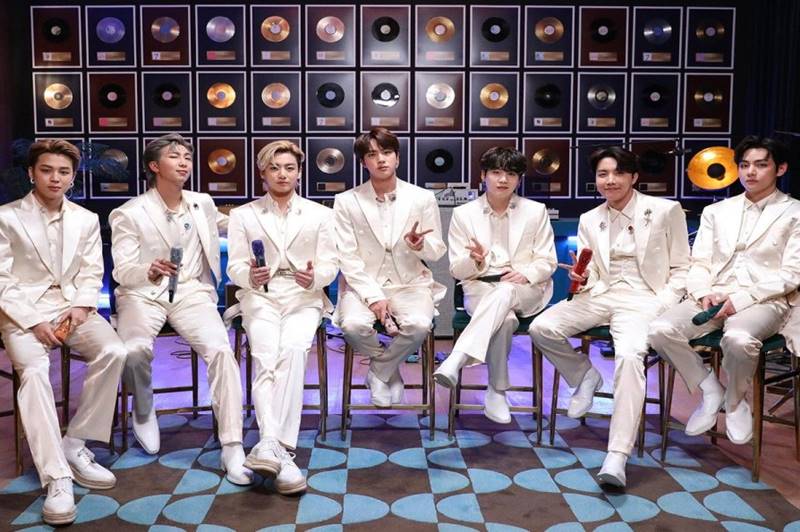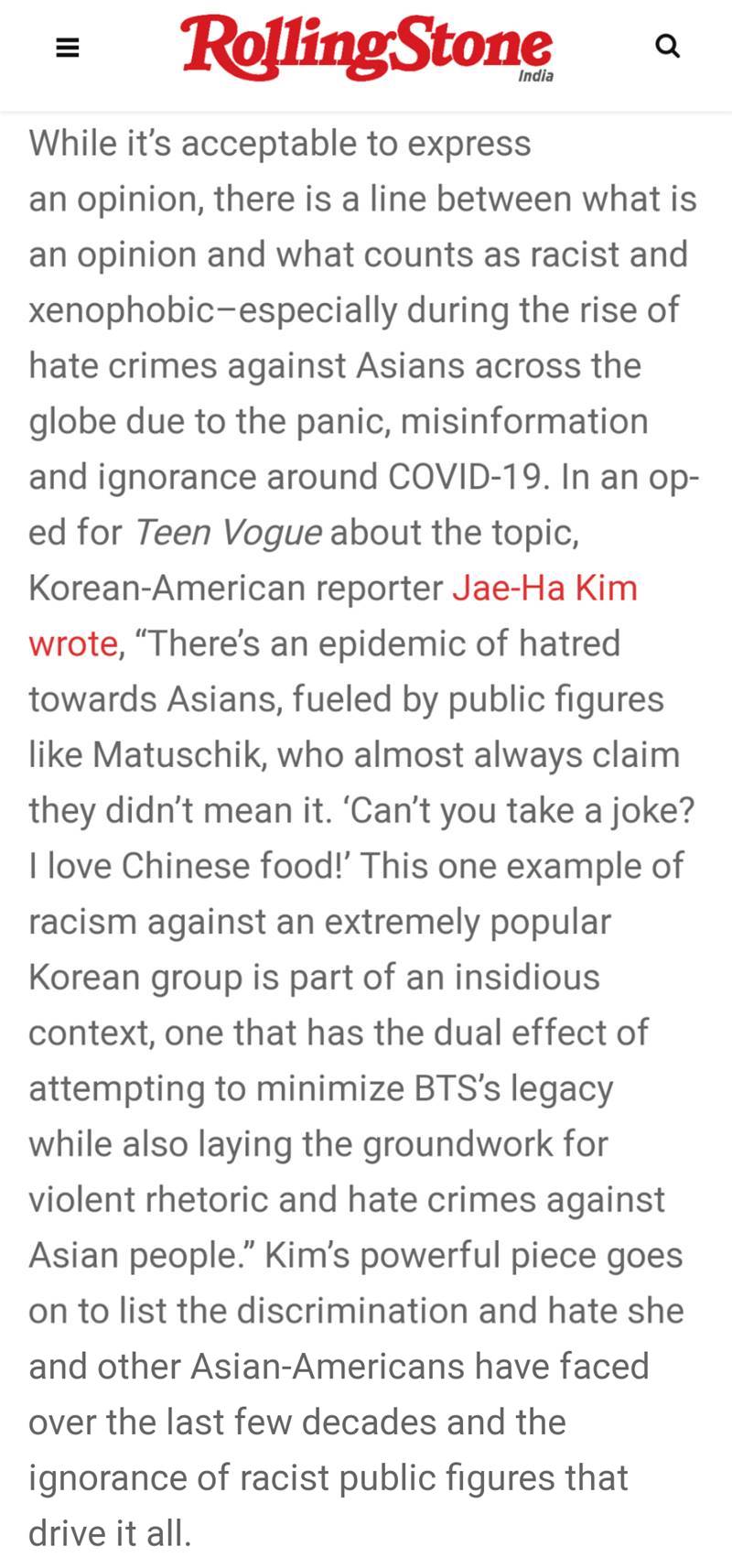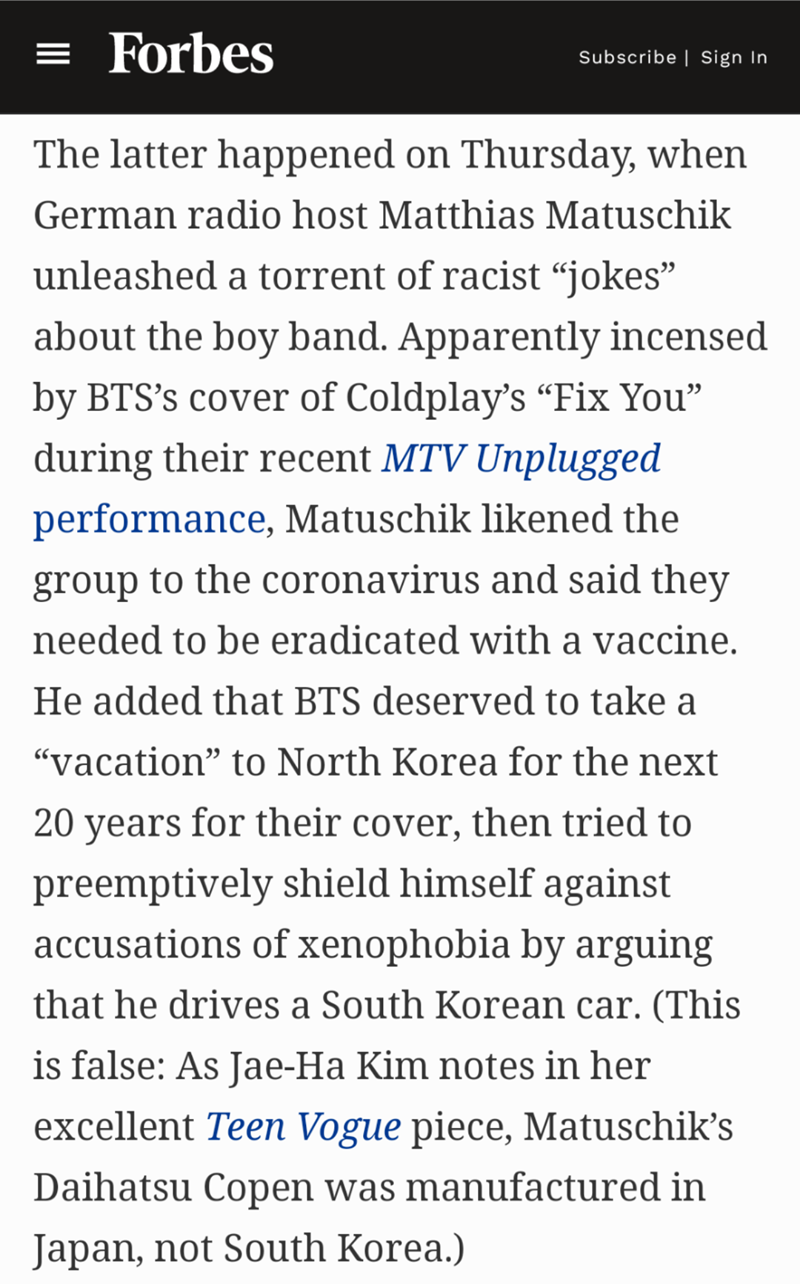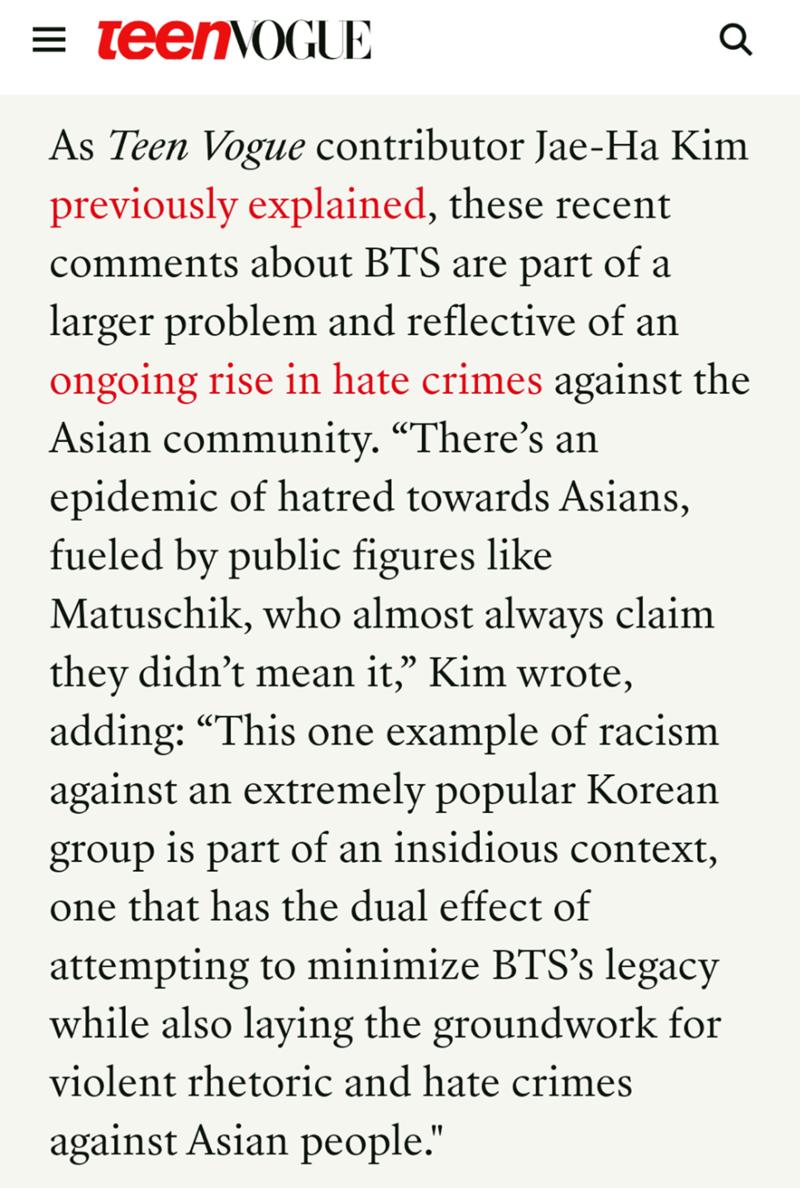By Jae-Ha Kim
Teen Vogue
February 26, 2021
Two days after BTS made a historic appearance on MTV Unplugged, a German radio personality compared the Korean septet to COVID-19. He suggested that the group should be eradicated with a vaccine, just like the deadly virus.
“These p—–s bragged about covering Fix You from Coldplay,” Bayern 3 host Matthias Matuschik said on-air Thursday. “This is sacrilege! They should be sent to North Korea for the next 20 years! … You can’t accuse me of xenophobia just because of this boy band. I have a car from South Korea.”
Except … it’s not. A quick look at his Instagram page shows off his Daihatsu Copen, which is a Japanese — not Korean — automobile. Matuschik’s inability to differentiate between Japanese and Korean auto manufacturers may appear to be a small, ignorant mistake. But it plays into the xenophobic attitude towards Asia and Asians that has skyrocketed since the onset of COVID-19 in 2020. While his reach isn’t nearly as wide as that of former President Donald Trump — who gleefully and willfully referred to Covid-19 as the China virus or the kung flu — his words encourage people to dehumanize a group of Korean men by equating them to a disease.
BTS’ U.S. label Columbia Records was quick to show their support: “Columbia Records stands with the Asian Community and condemns all forms of racism and xenophobia. We must all work together to strive for racial justice,” the account tweeted.
Matuschik’s employer Bayern 3 offered a tepid apology Thursday that downplayed his actions, pointing out that he simply didn’t like BTS’ rendition of “Fix You,” that his shtick is to be over-the-top blunt, and that hurting the feelings of BTS’ fans wasn’t his intention.
Later, Buzzfeed Germany quoted Matuschik, who implied he was misunderstood by a fanatical fandom that was pulling the race card.
In other words, both employer and employee issued the standard sorry if you were offended non-apology, placing the onus on fans. And what those fans found infuriating and hostile about Matuschik’s remarks is that he likened a group of Korean men to a deadly virus that has killed 2.5 million people worldwide — including nearly 69,000 people in Germany.
There’s an epidemic of hatred towards Asians, fueled by public figures like Matuschik, who almost always claim they didn’t mean it. Can’t you take a joke? I love Chinese food! This one example of racism against an extremely popular Korean group is part of an insidious context, one that has the dual effect of attempting to minimize BTS’s legacy while also laying the groundwork for violent rhetoric and hate crimes against Asian people.
Almost exactly a year ago, Sal Governale made a similar comment about BTS on The Howard Stern Show. “There’s no way those guys don’t have coronavirus,” Stern recalled him saying. Later, Governale tried to defend himself by describing what he saw when BTS arrived at SiriusXM’s New York headquarters.
“I walked into the lobby and it was like Chinatown, out of control, there were so many Asian people,” he remembered. “These people are traveling, they’re not locals, they’re going from country to country to country. It’s a dangerous situation. You got to look at it that way — they’re on airplanes; they’re in hotels.”
Chinatown. Asian people. Dangerous situation. These people. He was describing a South Korean band whose country has immaculate screening protocols for COVID-19, while he was living in a country that didn’t seem to know how to control the disease and dealt with it by ignoring its existence for much too long.
Racists view Asia as a monolith, rather than a continent comprised of more than 50 countries and territories. To them, all East Asians are the same – regardless of whether we were born in China, South Korea, the United States or Germany. We are a visible minority whose features make it difficult to blend in. We are judged as perpetual foreigners and, sometimes, as the enemy.
In June 1982, when America was experiencing a severe recession, two white men beat Vincent Chin to death in Detroit. They blamed the U.S.’s economic downfall on Japanese auto manufacturers and saw an easy target in Chin. It didn’t occur to them — or many other Americans at the time — that it was Americans who chose to buy Japanese cars, making U.S. cars less desirable. Rather than blaming the predominantly white Americans for buying foreign automobiles over those made in Detroit, they shifted the blame to Asian Americans, who they conflated as being the same as Japan’s population.
“It’s because of you little motherf—–s that we’re out of work!” Ronald Ebens said. He didn’t know or care that Chin was Chinese American, or that he worked in computer graphics and not in the automotive industry.
On what was to have been his wedding day, Chin’s body was laid to rest. Ebens and his stepson, Michael Nitz, paid a $3,000 fine. They served no time in prison. To put things into perspective, the American public was incensed that Lindsay Lohan spent just 84 minutes in jail for driving under the influence. But there was nary a peep when the trial judge said Ebens and Nitz weren’t “the kind of men you send to jail.” He may as well have said, “They only killed a Chinese man.”
Many years ago, I did an entertainment segment with a popular shock jock in Chicago. While waiting for my turn to talk about that weekend’s concerts, I heard him and his cohort phoning random Chinese restaurants. It soon became clear that their goal was to broadcast whoever answered the phone and mock their broken English. I remained silent, until one of them said “Chinaman.” Not one person in the studio spoke up, so I did: “Chinaman? Not cool, guys.”
They got a good laugh out of that, pretending not to know what I was talking about. This egged their callers on to verbally attack me. In the upcoming weeks, I received so many death threats from their rabid fans that the security protocol at the newspaper I worked for at the time had to be changed – all because their listeners were incensed that a “Chink bitch” dared to call out their faves. (By the way, I’m Korean, not Chinese, but it was all the same to them.)
When President Joe Biden signed a memorandum last month condemning and combating racism, xenophobia, and intolerance against Asian Americans and Pacific Islanders in the United States, it was a step in the right direction. But that alone won’t stop Asians from being targeted. We have to continue to speak out and call out racists, in whatever form they may take.
Make no mistake. This isn’t a witchhunt and Matuschik is not the victim. If a grown man — whose job it is to talk on the radio — can’t get across his true intent, does he even belong there?
“There’s an epidemic of hatred towards Asians, fueled by public figures like Matthias Matuschik, who almost always claim they didn’t mean it.” #BTS https://t.co/1xRJkA4Dzy
— Teen Vogue (@TeenVogue) February 26, 2021
— — —
My article was quoted by other journalists in outlets such as Rolling Stone, Forbes and Teen Vogue:










Thank you for this powerful article, @GoAwayWithJae. I had no idea about the tragic occurrence with Mr. Chin and it makes my blood boil. Also the incident involving you. Up until I started stanning BTS I had no idea abt racism against Asians in the US. It’s shocking and tragic.
Clearly the author has not lived in Korea as a foreigner, where the very patterns of discrimination s/he depicts against Asians are rampant against non-Koreans. Neither is acceptable. Also, fanatic fandom is a problem that does need to be addressed.
There’s no need for whataboutism. What does discrimination in Korea have to do with Koreans being discriminated against overseas?
Apart from the piece by Jae-Ha Kim who gave context to racism against BTS spoken from personal experience as a Korean-American, Bryan’s article is the only other one that gets to the crux of the issue. Everyone needs to read this to understand what ARMYs are protesting against.